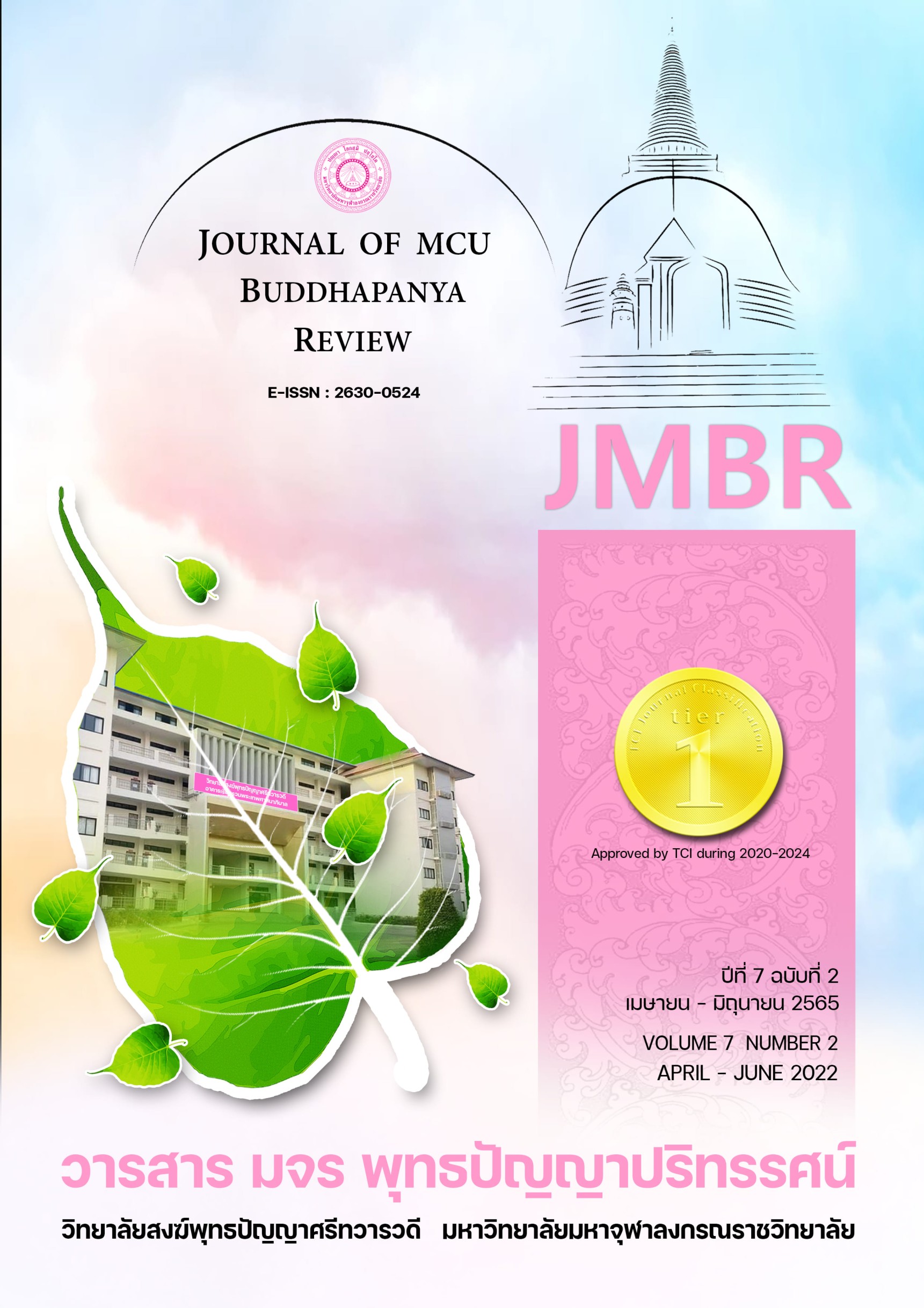การพัฒนาโมเดลสมการโครงสร้างพหุระดับจริยธรรมเชิงพุทธของผู้บริหารสถานศึกษา ที่ส่งผลต่อจิตลักษณะและพฤติกรรมการทำงานอย่างมีจริยธรรมเชิงพุทธ ของครูในโรงเรียนวิถีพุทธ สังกัดสำนักงานคณะกรรมการการศึกษาขั้นพื้นฐาน
คำสำคัญ:
Buddhist Ethics, Psychological, Ethical Work Behaviorบทคัดย่อ
การวิจัยนี้มีวัตถุประสงค์เพื่อ 1) เพื่อศึกษาระดับจริยธรรมเชิงพุทธของผู้บริหารสถานศึกษา 2) เพื่อศึกษาอิทธิพลของจริยธรรมเชิงพุทธของผู้บริหารสถานศึกษาที่ส่งผลต่อจิตลักษณะและพฤติกรรมการทำงานอย่างมีจริยธรรมเชิงพุทธของครู และ 3) เพื่อทดสอบความสอดคล้องกลมกลืนของโมเดลกับข้อมูลเชิงประจักษ์ การวิจัยครั้งนี้เป็นการวิจัยเชิงปริมาณ ประชากรและกลุ่มตัวอย่าง ได้แก่ ครู และผู้บริหารสถานศึกษาในโรงเรียนวิถีพุทธ สังกัดสำนักงานคณะกรรมการการศึกษาขั้นพื้นฐาน จำนวน 500 คน ได้มาโดยวิธีการสุ่มแบบหลายขั้นตอน เครื่องมือที่ใช้ในการวิจัย คือ แบบสอบถามแบบมาตราส่วนประมาณค่า 5 ระดับ จำนวน 2 ฉบับ ได้แก่ แบบสอบถามสำหรับครูและผู้บริหารสถานศึกษา มีค่าความเชื่อมั่นเท่ากับ .99 และ .96 สถิติที่ใช้ ได้แก่ สถิติเชิงพรรณนา และค่าสหสัมพันธ์ภายในชั้นของตัวแปร (ICC) ตรวจสอบความเที่ยงตรงโครงสร้างด้วยการวิเคราะห์องค์ประกอบเชิงยืนยันระดับเดียวและพหุระดับ และการทดสอบโมเดลสมการโครงสร้างพหุระดับ (MSEM) ด้วยวิธีการประมาณค่าแบบ MLR ผลการวิจัยพบว่า 1) ระดับจริยธรรมเชิงพุทธของผู้บริหารสถานศึกษา อยู่ในระดับมาก 2) จริยธรรมเชิงพุทธของผู้บริหารสถานศึกษามีอิทธิพลต่อจิตลักษณะและพฤติกรรมการทำงานอย่างมีจริยธรรมเชิงพุทธของครูทั้งอิทธิพลทางตรง อิทธิพลทางอ้อมและอิทธิพลรวมอย่างมีนัยสำคัญ และ 3) โมเดลสมการโครงสร้างพหุระดับจริยธรรมเชิงพุทธของผู้บริหารสถานศึกษาที่ส่งผลต่อผลลัพธ์ด้านคุณสมบัติของทีมงาน จิตลักษณะของครู และพฤติกรรมการทำงานอย่างมีจริยธรรมเชิงพุทธของครูในโรงเรียนวิถีพุทธ สังกัดสำนักงานคณะกรรมการการศึกษาขั้นพื้นฐานที่ผู้วิจัยพัฒนาขึ้นสอดคล้องกับข้อมูลเชิงประจักษ์ในเกณฑ์ดี (c2/df = 0.977, CFI = 1.00, TLI = 1.00, RMSEA = 0.000, SRMR = 0.024)
เอกสารอ้างอิง
Boss, J. A. (2011). Ethics for Life : A Text With Reading. (5th ed). New York: McGraw-Hill
Brahmagunabhorn (P.A. Payutto). (2011). A Constitution for Living. (23rd Edition). Bangkok: Thammasapa.
Brahmagunabhorn (P.A. Payutto). (2011). It's Time to Reengineer the Human Development System. (8nd Edition). Watyanavesakavan: Nakhonpathom.
Chairueng, N. (2008). The multi-level factors affecting success in developing students' ethics of prototype buddhist schools under The Office of Basic Education Commission. Journal of Educational Administration Burapha University, 2(2), 67-80.
Erawan, P. (2019). Research and Organization Development in Schools. (3rd Edition). Mahasarakham: Mahasarakham University.
Grassian, V. (1992). Moral Reasoning : Ethical Theory and Some Contemporary Moral Problems. (2nd ed.). Englewood Cliff, New Jersey: Prentice Hall.
Hair, J. F. (2019). Multivariate data analysis (8th ed.): Andover : Cengage.
Kohlberg, L. (1976). Moral stages and moralization: The cognitive-developmental. In Moral development and behavior: Theory, research and social issues. New York: Holt, Rinehart and Winston.
Mongkhonvanit, J. (2013). Administration of education organization and personnel. (2nd Edition). Bangkok: Chulalongkorn University Printing House.
Newstrom, J. W. (2015). Organizational behavior : human behavior at work. (14th ed., international student ed.). New York McGraw-Hill Education.
Pakotung, J. (2014). Management techniques for Professional Executives. (2nd Edition). Ubonratchathani: sirithamoffset.
Phrakhru Sophonpariyatsuthi. (2015). Buddhadhamma and administration. (2nd Edition). Phayao: Charoen-aksorn.
Phukhamwong, P. (2017).The Implication of the Buddhist Ethic for Advanced Progress of School Administrators in the Small-sized Schools. Humanities and Social Sciences Journal, Ubon Ratchathani Rajabhat University, 8(2), 148–159.
Pojman, L. P. (1995). Ethical theory : classical and contemporary readings. (2nd ed). Belmont, Calif: Wadswoth.
Rachels, J. (2012). The elements of moral philosophy. (9rd ed). Boston: McGraw-Hill College.
Robbin, S. P. (2005). Organizational Behavior. (11th ed). New Jersey: Pearson Education.
Sansai, C. (2013). The Influences, Kalyanamitt, Yonisomanasikan, Belief in Kusonkammabot 10
and Psychologica Factors Effects the Desirable Student Behavior. Journal of Behavioral Science for Development, 5(1), 214-228.
Shaw, W. H. (2013). Social and Personal Ethics. (8th ed). Belmont, California: Wadsworth Publishing Company.
Sirilai, S. (2018). Creating an ethical climate in organization. Bangkok: Royal Academy.
Somdet Phra Buddhaghosacariya (P.A. Payutto). (2018). Buddhadhamma. (Original Edition). Bangkok: Thammasapa.
Thampitak, P. (2015). A Multilevel Structural Equation Modeling of the Causal Variables, Ethical Leadership of Leaders, and their Influence on Psychological Antecedents and Work Behavior Outcomes of Private Organization Employees. (Doctoral Dissertation). Srinakharinwirot University.
Tongkhambanjong, S. (2002). A Study of Buddhism Ethical Structure of Undergraduate: Conceptualization, Measurements of Changes, and Causal Models of Change. (Doctoral Dissertation). Srinakharinwirot University.
Yamane, Taro. (1973). Statistics: An Introductory Analysis. 3rd ed. New York: Harper and Row Public.
ดาวน์โหลด
เผยแพร่แล้ว
รูปแบบการอ้างอิง
ฉบับ
ประเภทบทความ
สัญญาอนุญาต
ลิขสิทธิ์ (c) 2022 วารสาร มจร พุทธปัญญาปริทรรศน์

อนุญาตภายใต้เงื่อนไข Creative Commons Attribution-NonCommercial-NoDerivatives 4.0 International License.



